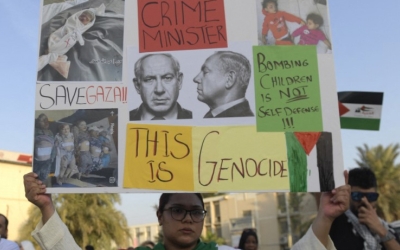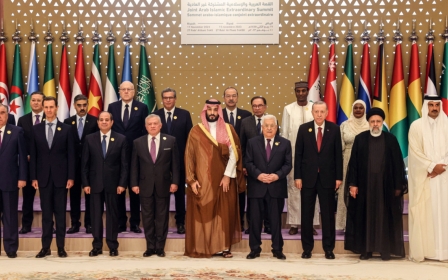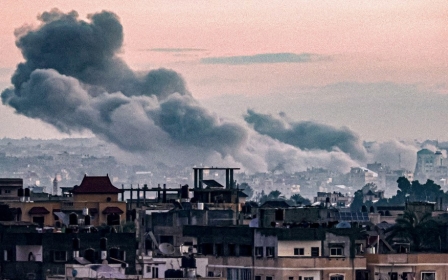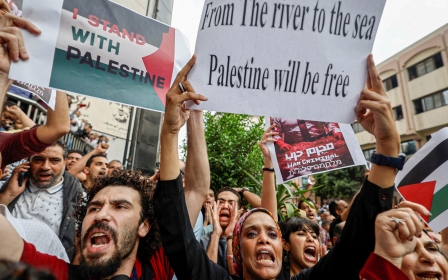Gaza war: Arab regimes ignore popular support for Palestine at their peril
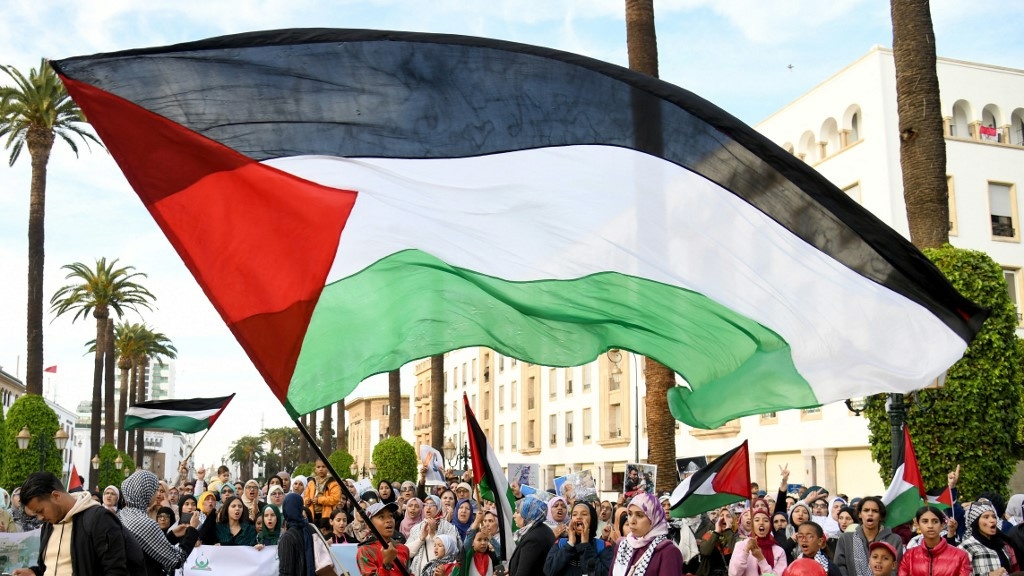
A new survey from the Arab Center for Research and Policy Studies has found that Arabs are more pro-Palestinian than they have been at any point since 2011, the year the organisation began systematically polling Arab public opinion on Israel-Palestine and other issues.
In the most recent survey, conducted between 12 December and 5 January, the centre polled 8,000 Arabs in 16 countries that represent more than 95 percent of the population of the Arab region. Respondents were asked a variety of questions about the Palestinian cause, the 7 October attack on Israel by Hamas, Israel’s war on Gaza, and US policy.
The findings suggest that Israel’s war on Gaza, likely a genocide under international humanitarian law, has increased Arab support for Palestinians, and amplified anti-Israel and anti-US sentiments.
A massive 92 percent of respondents said the Palestinian cause was an issue of concern for all Arabs, not just Palestinians. This represents a significant increase from the 76 percent reported in the centre’s 2022 poll; indeed, it is the highest figure ever recorded.
The survey also shows strong evidence of Arab public support for Hamas, which governs Gaza but is proscribed as a terrorist organisation by the UK and other countries.
New MEE newsletter: Jerusalem Dispatch
Sign up to get the latest insights and analysis on Israel-Palestine, alongside Turkey Unpacked and other MEE newsletters
Nearly 90 percent of Arab respondents said they considered the 7 October attack by Hamas to be a “legitimate resistance operation” or a “somewhat flawed but legitimate resistance operation”.
Importantly, a total of 89 percent of respondents said they rejected recognising Israel, the highest figure in the centre’s polling history. Only 13 percent of surveyed Arabs said they believed that peace with Israel remains possible.
Stalled momentum
Opinions about the US also appear to have grown more negative as a result of the Gaza war. More than 90 percent of respondents said the US response to recent events has been “bad” or “very bad”, with 76 percent saying their opinion of US policy had become more negative since 7 October.
It is worth considering the implications of these results for Israeli normalisation efforts. In 2020, four Arab countries - the United Arab Emirates, Morocco, Sudan and Bahrain - agreed to normalise relations with Israel.
Follow Middle East Eye's live coverage of the Israel-Palestine war
These deals were significant, in part because they bypassed Palestinians and seemed to do away with concerns about Israel’s illegal occupation of Palestinian territories. While Zionists praised the normalisation efforts, scholars and pro-Palestinian groups saw them as a betrayal of the Palestinian cause.
Since 2020 and before 7 October, there had been momentum for more widespread normalisation, with Saudi Arabia well on its way towards making a deal. But Israel’s war on Gaza, and the negative sentiments it has engendered about Israel in the Arab world, could make future normalisation agreements less likely - or at least more difficult to execute.
In the centre’s latest survey, 68 percent of Saudi Arabian respondents said they rejected recognising Israel - nearly double the 38 percent who said this in 2022.
Arab governments would be wise to listen to the calls of their populations. It is always difficult to predict how public anger may manifest
Moroccan and Sudanese Arabs are also more likely now to reject recognising Israel than they were in 2022. In Morocco, rejection of recognition rose to 78 percent from 67 percent, while Sudanese rejection rose to 81 percent from 72 percent. These findings underscore the daunting task faced by Arab regimes attempting to normalise with Israel going forward.
As South Africa’s genocide case at the International Court of Justice has made clear, Israel has, since 7 October, issued numerous statements that appear to show genocidal intent, while Israeli forces have killed more than 24,000 Palestinians, including 10,000 children.
It will be difficult to convince Arab citizens, most of whom are overwhelmingly sympathetic to the Palestinian plight, of the political, ethical and religious appropriateness of normalising relations with a state that has bombed civilian areas indiscriminately, targeted hospitals, shelters and safe routes, and systematically prevented humanitarian aid from reaching innocent civilians.
United in anger
Going forward, the question for Arab regimes will revolve around the extent to which they are willing to ignore popular sentiments. Pushing ahead with Israel normalisation against the will of their citizens could prove risky.
Indeed, Arab publics appear united in anger. The last time anger was this palpable on the Arab streets was during the Arab Spring era, which led to calls for democracy and widespread popular protests. Will Arab governments be willing to roll the dice on normalisation agreements that could lead to unrest? Only time will tell.
More than anything, perhaps, the recent survey results demonstrate the massive disconnect between some Arab regimes and their citizenries.
With rare exceptions, most Arab governments have delivered only relatively mild rebukes of Israeli atrocities, and popular calls for action against Israel - including calls for an oil embargo - have not gained traction with Arab governments. Importantly, previously agreed-upon normalisation deals have continued unabated.
Egypt’s handling of the Rafah border crossing has perhaps best illustrated the disconnect between Arab governments and the Arab street. Egypt has not fully opened the Rafah crossing - a critical failing, since allowing essential aid into Gaza would mitigate the current humanitarian catastrophe.
For months, the Egyptian regime has obstructed the work of aid workers and stifled Rafah-related protests, even arresting foreign activists attempting to mobilise aid. Last week, an Egyptian woman who carried out a modest street protest, waving a Palestinian flag while chanting for justice, was arrested by Egyptian authorities.
Acts of tragic, oppressive violence can sometimes catalyse significant change. This was the case during the Arab Spring, when Arab regime violence led to unprecedented public anger, massive street protests and calls for democracy. It is possible, perhaps even likely, that the Gaza genocide could mark a substantive change in Arab politics.
No one knows for sure what the next round of survey results will show. But unless Arab regimes do something to meaningfully check Israeli and US aggression - and to better align their policies with the desires of their citizenries, while creating better economic opportunities - anger and frustration in the Arab street will likely continue to rise.
Arab governments would be wise to listen to the calls of their populations. It is always difficult to predict how public anger may manifest.
The views expressed in this article belong to the author and do not necessarily reflect the editorial policy of Middle East Eye.
Middle East Eye delivers independent and unrivalled coverage and analysis of the Middle East, North Africa and beyond. To learn more about republishing this content and the associated fees, please fill out this form. More about MEE can be found here.



